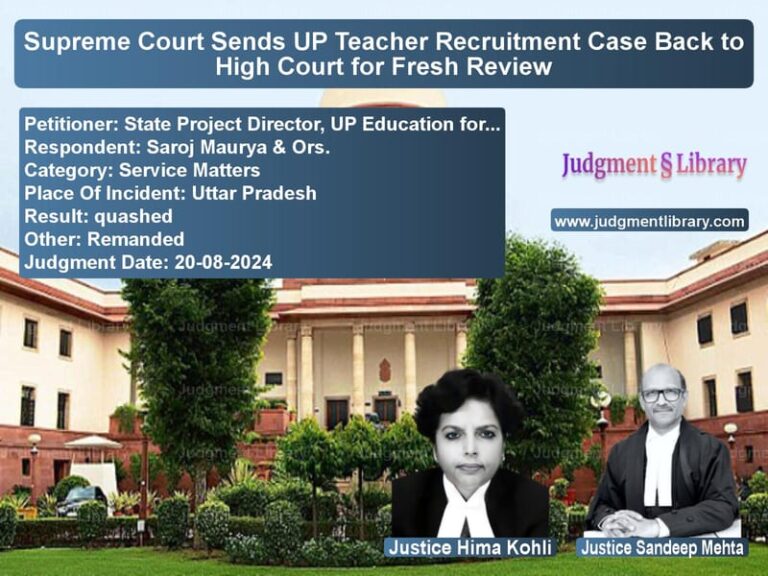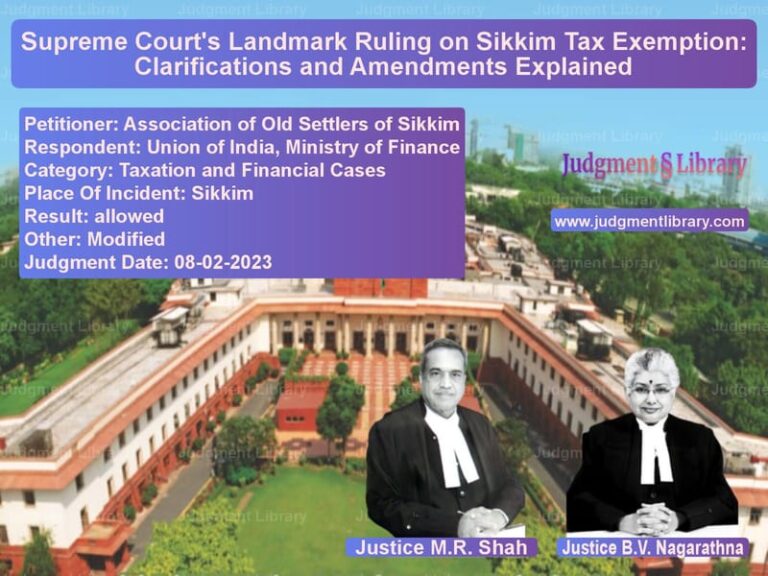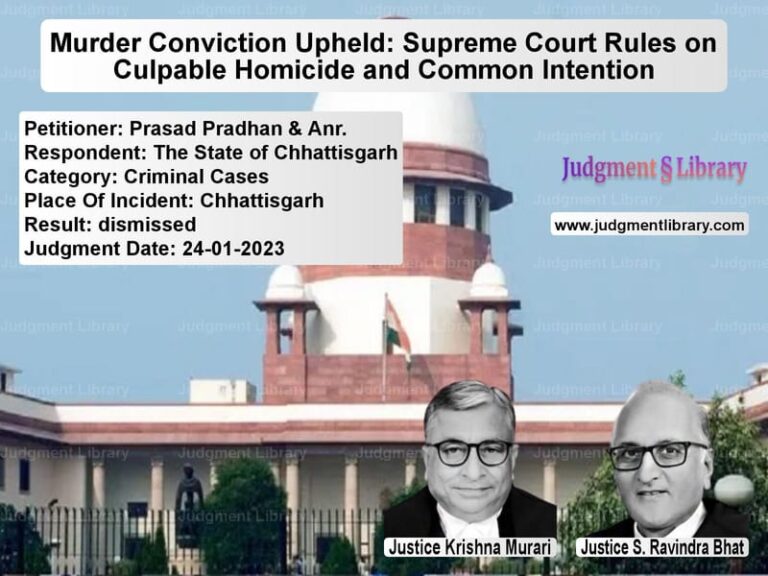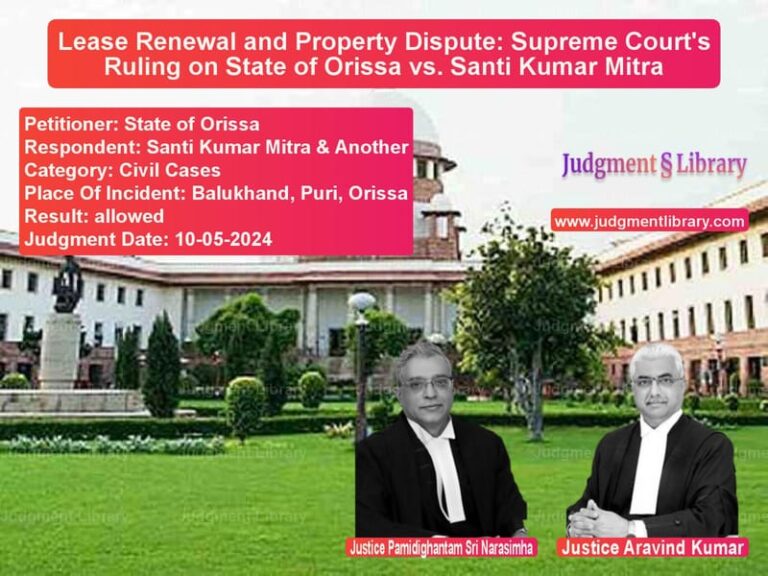Arbitration Clause Enforcement: Supreme Court Appoints Arbitrator in Business Dispute
In a significant ruling concerning arbitration in business contracts, the Supreme Court of India addressed the issue of enforcing arbitration clauses in agreements. The case involved Purple India Holdings Ltd. as the petitioner and Drilling & Offshore Pte. Ltd. as the respondent. The dispute arose over the appointment of an arbitrator in line with an arbitration clause contained in an engagement letter dated October 24, 2013.
Background of the Case
The petitioner, Purple India Holdings Ltd., and the respondent, Drilling & Offshore Pte. Ltd., had entered into an engagement letter specifying arbitration as the mechanism for resolving disputes. The arbitration clause clearly stated that any disputes arising from the engagement letter should be resolved amicably, and failing that, arbitration proceedings would take place in Mumbai under the Indian Arbitration and Conciliation Act, 1996.
The agreement required each party to appoint one arbitrator, and those two arbitrators would then appoint a third, who would serve as the presiding arbitrator. However, when a dispute arose, the respondent failed to appoint its arbitrator despite receiving a request from the petitioner on January 28, 2015. Left with no alternative, the petitioner approached the Supreme Court under Section 11(6) of the Arbitration and Conciliation Act, 1996, seeking the appointment of an arbitrator.
Legal Issues Considered
- Whether the arbitration clause in the engagement letter was valid and enforceable.
- Whether the Supreme Court had the authority to appoint an arbitrator under Section 11(6) of the Arbitration and Conciliation Act, 1996.
- Whether the respondent’s failure to appoint an arbitrator justified judicial intervention.
Petitioner’s Arguments
The petitioner argued that the arbitration clause in the engagement letter was legally binding and enforceable. It asserted that despite being formally requested, the respondent had failed to appoint its arbitrator, making it impossible for the arbitration process to proceed as agreed. The petitioner emphasized that under Section 11(6) of the Arbitration and Conciliation Act, 1996, the Supreme Court had the authority to intervene and appoint an arbitrator when one party refuses to cooperate.
Additionally, the petitioner contended that arbitration was the agreed method of dispute resolution, and allowing the respondent to ignore its obligations would undermine the principles of contract law and arbitration law in India. Therefore, the petitioner urged the Supreme Court to uphold the arbitration agreement and ensure that disputes were resolved as per the agreed terms.
Respondent’s Absence
Despite receiving notices, the respondent failed to appear before the Court to contest the petition. The absence of the respondent meant that the Court had to decide the matter based solely on the petitioner’s submissions and supporting documents.
Supreme Court’s Observations
The Supreme Court, after reviewing the case, acknowledged the validity of the arbitration clause. The Court noted that under the Arbitration and Conciliation Act, 1996, a party cannot refuse to comply with an arbitration agreement once it has been executed. The Court further stated:
“The averments made in the petition must, in the absence of any counter from the respondent, be taken to be correct at least for the purposes of deciding whether the matter ought to be referred to an Arbitrator.”
The judges also noted that the engagement letter explicitly provided for arbitration as the dispute resolution mechanism and that the respondent’s failure to appoint an arbitrator, despite being requested to do so, left the petitioner with no option but to seek judicial intervention.
Judgment and Directives
The Supreme Court granted the petitioner’s request and appointed Hon’ble Mr. Justice H.S. Bedi, former Judge of the Supreme Court of India, as the sole arbitrator to adjudicate the dispute. The Court also clarified that it was not expressing any opinion on the merits of the case and that those aspects should be addressed in the arbitration proceedings.
The arbitrator was given the authority to issue notices to the parties and determine his own fees. The Court also instructed that the arbitration proceedings be conducted in English, as specified in the engagement letter.
Key Takeaways from the Judgment
- The Supreme Court reaffirmed that arbitration agreements in contracts must be upheld.
- If one party refuses to cooperate in appointing an arbitrator, the Court has the authority under Section 11(6) of the Arbitration and Conciliation Act, 1996, to appoint an arbitrator.
- The absence of the respondent did not prevent the Court from making a decision.
- The arbitration process should proceed without unnecessary delays, and courts will intervene when required to uphold contractual obligations.
Implications of the Judgment
This ruling strengthens arbitration as a preferred dispute resolution mechanism in commercial agreements. It sends a clear message that courts will enforce arbitration clauses and ensure that businesses cannot evade their contractual obligations by refusing to participate in arbitration. The judgment reinforces the principle that arbitration must be conducted in a fair and efficient manner, free from unnecessary litigation delays.
Furthermore, by appointing an experienced former Supreme Court judge as the arbitrator, the Court ensured that the dispute would be handled by a competent and impartial authority, instilling confidence in the arbitration process.
Don’t miss out on the full details! Download the complete judgment in PDF format below and gain valuable insights instantly!
Download Judgment: Purple India Holding vs Drilling & Offshore Supreme Court of India Judgment Dated 29-03-2016-1741854003588.pdf
Direct Downlaod Judgment: Direct downlaod this Judgment
See all petitions in Arbitration Act
See all petitions in Dispute Resolution Mechanisms
See all petitions in Commercial Arbitration
See all petitions in Judgment by T.S. Thakur
See all petitions in Judgment by R. Banumathi
See all petitions in Judgment by Uday Umesh Lalit
See all petitions in allowed
See all petitions in settled
See all petitions in supreme court of India judgments March 2016
See all petitions in 2016 judgments
See all posts in Arbitration and Alternate Dispute Resolution Category
See all allowed petitions in Arbitration and Alternate Dispute Resolution Category
See all Dismissed petitions in Arbitration and Alternate Dispute Resolution Category
See all partially allowed petitions in Arbitration and Alternate Dispute Resolution Category







